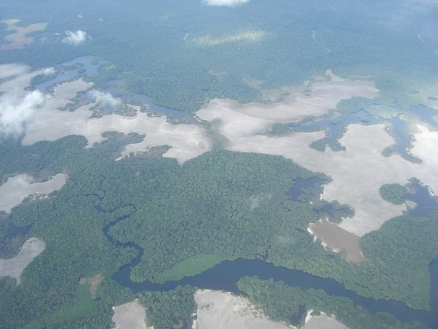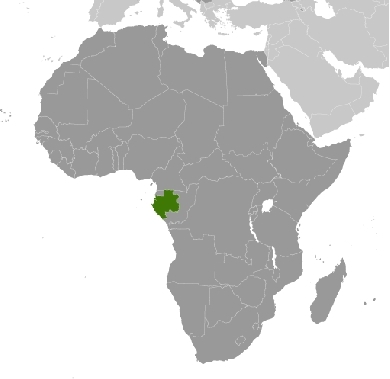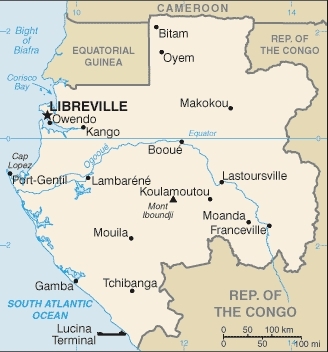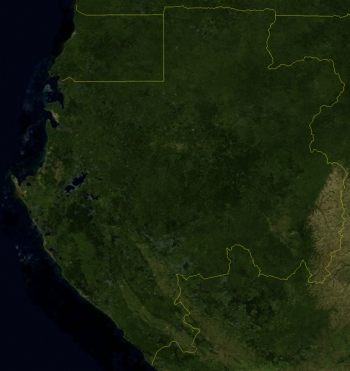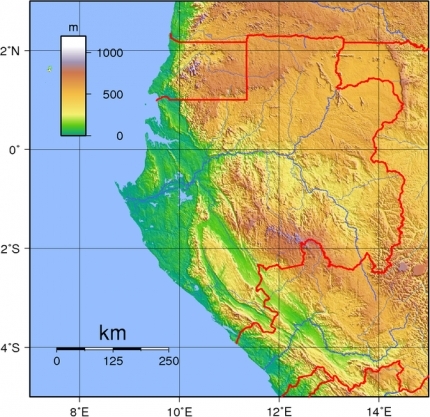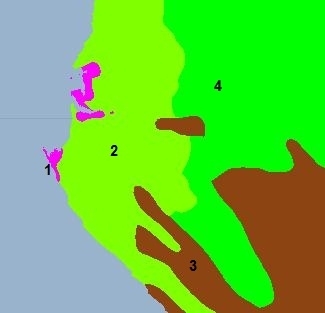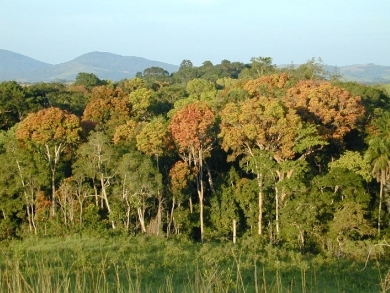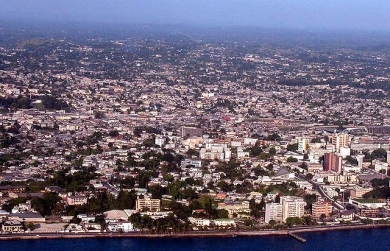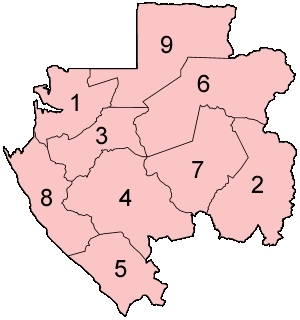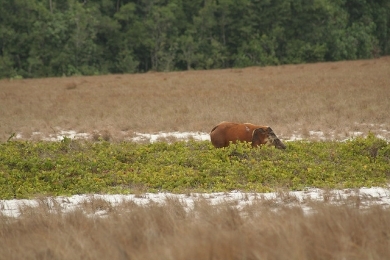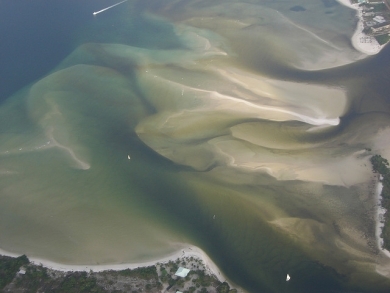Gabon
Gabon is a nation of one-and-a-half million people in west-central Africa, bordering the Atlantic Ocean at the Equator, between Republic of the Congo and Equatorial GuineaCountries and Regions of the World Collection  .
.
A small population and oil and mineral reserves have helped Gabon become one of Africa's wealthier countries. Iin general, these circumstances have allowed the country to maintain and conserve its pristine rain forest and rich biodiversity.
Gabon's major environmental issues include: deforesting and poaching.
More than a third of the population lives in the capitol city, Libreville.
Until recently, only two autocratic presidents have ruled Gabon since independence from France in 1960.
The recent president of Gabon, El Hadj Omar Bongo Ondimba - one of the longest-serving heads of state in the world - had dominated the country's political scene for four decades. President Bongo introduced a nominal multiparty system and a new constitution in the early 1990s. However, allegations of electoral fraud during local elections in 2002-03 and the presidential elections in 2005 exposed the weaknesses of formal political structures in Gabon. President Bongo died in June 2009.
New elections in August 2009 brought Ali Ben Bongo, son of the former president, to power.
Despite political conditions, a small population, abundant natural resources, and considerable foreign support have helped make Gabon one of the more prosperous and stable African countries.
Contents
Geography
Location: Western Africa, bordering the Atlantic Ocean at the Equator, between the Republic of the Congo and Equatorial Guinea
Geographic Coordinates: 1 00 S, 11 45 E
Area: 267,667 km2 (257,667 km2 land and 10,000 km2water)
arable land: 1.21%
permanent crops: 0.64%
other: 98.15% (2005)
Land Boundaries: 2,551 km. Border countries: Cameroon 298 km, Republic of the Congo 1,903 km, Equatorial Guinea 350 km
Note: The UN urges Equatorial Guinea and Gabon to resolve the sovereignty dispute over Gabon-occupied Mbane Island and lesser islands and to establish a maritime boundary in hydrocarbon-rich Corisco Bay
Coastline: 885 km
Maritime Claims:
territorial sea: 12 nm
contiguous zone: 24 nm
exclusive economic zone: 200 nm
Terrain: Narrow coastal plain; hilly interior; savanna in east and south. Its lowest point is the Atlantic Ocean (0 metres) and its highest point is Mont Iboundji (1,575 metres)
Climate: Tropical; always hot, humid
|
Satellite View of Gabon. Source: NASA |
Topography of Gabon. Source: Wikimedia Commons |
Ecology and Biodiversity
|
1. Central African mangroves flank thecoastline of western and central Africa, in suitable low energy marine environments.The most important remaining blocks of habitat are found in the Niger River Delta in Nigeria, to the east of the mouth of the Cross River in Nigeria and Cameroon, around Doula in Cameroon, and the Muni Estuary and Como River in Gabon. 2. Atlantic Equatorial coastal forestsextend from the Sanaga River in west-central Cameroon south through Equatorial Guinea into the coastal and inland areas of Gabon. There are exceptionally high levels of species richness and endemism, contains large blocks of evergreen lowland moist forest, and the central portion has one of the lowest human population densities in Africa. The lowland forests are multi-layered, with tall trees and canopies up to 60 meters (m) high. Near the coast the vegetation is somewhat different, especially in Gabon, where there are long strips of coastal savanna mosaic known as Guineo-Congolian edaphic grassland. These coastal savannas intergrade with low coastal forest and scrub, which gradually give way to continuous moist forest cover further inland. 3. Western Congolian forest-savanna mosaic 4. Northwestern Congolian lowland forests stretches across four countries - Cameroon, Gabon, Republic of Congo, and the Central African Republic. Large areas of the interior, especially in Gabon and Congo, are almost devoid of human inhabitants, with population densities as low as one person per km2 |
Gabon ranks first as the as the least populated, forested country in Africa. In Gabon, apart from the logging camps, the forests are inhabited at low densities by agricultural and fishing people as well as small groups of forest dwelling Bakola and Bagyeli peoples.
Protected areas include part of the Lopé Reserve, the large Gamba complex of protected areas and the Wonga-Wongué Presidential Reserve. An additional 13 forest National Parks are in the process of being established in Gabon. The declaration of the Minkébé Forest Reserve (5,650 km2) marked a significant enhancement of the conservation area network in Gabon. Important Bird Areas include Ipassa Strict Nature Reserve and Minkébé Forest Reserve in Gabon.
There are also oil exploration and production facilities in Gabon, that are fragmenting the forest to some extent and favoring human settlements. In the past, elephant poaching was less pronounced in Gabon than elsewhere, but now seems to be on the increase.
See also:
Central Africa and coastal and marine environments
Population and Society
Population: 1,608,321 (July 2012 est.)
Gabon is one of the least densely inhabited countries in Africa, with a population that is estimated at 1,545,255.
Almost all Gabonese are of Bantu origin. Gabon has at least 40 ethnic groups, with separate languages and cultures. The largest ethnicity is the Fang (about 30%). Other ethnic groups include the Nzebi, Myene, Bandjabi, Eshira, Bapounou, Bateke/Obamba, and Bakota.
Ethnic group boundaries are less sharply drawn in Gabon than elsewhere in Africa. Most ethnicities are spread throughout Gabon, leading to constant contact and interaction among the groups. Intermarriage between the ethnicities is quite common, helping reduce ethnic tensions. French, the official language, is a unifying force. The Democratic Party of Gabon's historical dominance also has served to unite various ethnicities and local interests into a larger whole.
More than 10,000 native French live in Gabon, including an estimated 2,000 dual nationals. France dominates foreign cultural and commercial influences.
Ethnic groups: Bantu tribes, including four major tribal groupings (Fang, Bapounou, Nzebi, Obamba); other Africans and Europeans, 154,000, including 10,700 French and 11,000 persons of dual nationality
|
Tropical forest in Gabon. Source: NASA/JPL-Caltech |
| Libreville, Gabon. Source: Global Photographer/Wikimedia commons |
Age Structure
0-14 years: 42.2% (male 333,746/female 330,959)
15-64 years: 54% (male 424,392/female 426,478)
65 years and over: 3.9% (male 25,687/female 35,403) (2011 est.)
Population Growth Rate: 1.977% (2012 est.)
Birthrate: 35 births/1,000 population (2012 est.)
Death Rate: 13.07 deaths/1,000 population (July 2012 est.)
Net Migration Rate: -2.16 migrant(s)/1,000 population (2012 est.)
Life Expectancy at Birth: 52.29 years
male: 51.65 years
female: 52.93 years (2012 est.)
Total Fertility Rate: 4.56 children born/woman (2012 est.)
Languages: French (official), Fang, Myene, Nzebi, Bapounou/Eschira, Bandjabi
Literacy (1995 est.): 63.2% (male: 73.7% - female: 53.3%)
Urbanization: 86% of total population (2010) growing at an annual rate of change of 2.1% (2010-15 est.)
History
Over the last 7 centuries, Bantu ethnic groups arrived in the area from several directions to escape enemies or find new land. In the process they displaced other groups in the region, among them the pygmies who now inhabit the jungle in the country’s far east. Gabon's first European visitors were Portuguese traders who arrived in the 15th century. They named the area after the Portuguese word "gabao," a coat with sleeves and hood resembling the shape of the Komo River estuary. Dutch, British, and French traders followed the Portuguese in the 16th century, and the coast became a center of the slave trade. In a bid to beat the other European powers, France began to formalize its status in Gabon by signing treaties with Gabonese coastal chiefs in 1839 and 1841.
Libreville, the capital, grew out of a series of small settlements along the Komo River estuary. The first settlement was started in 1842 by American missionaries from New England who established a Presbyterian mission on a hilltop overlooking the estuary. The mission, called Baraka, is now located in the section of Libreville called Glass. In 1849, the population along the Komo River estuary swelled when the French captured an illegal slave ship and released the passengers at the mouth of the Komo River. The slaves named their settlement Libreville--"free town."
The interior remained relatively unexplored by outsiders until the mid-19th century. An American, Paul du Chaillu, was among the first foreigners to explore the interior of the region in the 1850s. Between 1862 and 1887, French explorers penetrated the dense jungles of what would become Gabon. The most famous, Savorgnan de Brazza, used local Bantu bearers and guides in his search for the headwaters of the Congo River.
Capitalizing on treaties signed with indigenous chiefs earlier in the century, France occupied Gabon in 1885 during the European scramble for Africa. However, it did not begin to administer it until 1903. In 1910, Gabon became one of the four territories of French Equatorial Africa, a federation that survived until 1959. The territories became independent in 1960--forming the independent nations of the Central African Republic, Chad, Congo (Brazzaville), and Gabon.
At the time of Gabon's independence in 1960, two principal political parties existed: the Bloc Democratique Gabonais (BDG), led by Leon M'Ba, and the Union Democratique et Sociale Gabonaise (UDSG), led by J.H. Aubame. In the first post-independence election, held under a parliamentary system, neither party was able to win a majority. The BDG obtained support from three of the four independent legislative deputies, and M'Ba was named Prime Minister. Soon after this the two parties agreed that Gabon did not have enough people to support a two-party system, and the two party leaders agreed on a single list of candidates, starting with the 1961 presidential election. In that election, held under the new presidential system, M'Ba became President and Aubame became Foreign Minister.
This one-party system appeared to work until February 1963. Then, the larger BDG element forced the UDSG members to choose between a merger of the parties or resignation. The UDSG cabinet ministers resigned, and M'Ba called an election for February 1964 and at the same time reduced the number of National Assembly deputies from 67 to 47. The UDSG failed to muster a list of candidates able to meet the requirements of the electoral decrees. When the BDG appeared likely to win the election by default, the Gabonese military toppled M'Ba in a bloodless coup on February 18, 1964. French troops re-established his government the next day. Elections were held in April 1964 with many opposition participants. BDG-supported candidates won 31 seats and the opposition 16. Late in 1966, the constitution was revised to provide for automatic succession of the vice president should the president die in office. In March 1967, Leon M'Ba and Omar Bongo (then Albert Bongo) were elected President and Vice President. M'Ba died later that year, and Omar Bongo became President.
In March 1968, Bongo declared Gabon a one-party state by dissolving the BDG and establishing a new party--the Parti Democratique Gabonais (PDG). He invited all Gabonese, regardless of previous political affiliation, to participate. Bongo sought to forge a single national movement in support of the government's development policies, using the PDG as a tool to submerge the regional and tribal rivalries that had divided Gabonese politics in the past. Bongo was elected President in February 1975; in April 1975, the position of vice president was abolished and replaced by the position of prime minister, who had no right to automatic succession. Bongo was re-elected President in both December 1979 and November 1986 to 7-year terms.
Economic discontent and a desire for political liberalization provoked violent demonstrations and strikes by students and workers in early 1990. In response to grievances by workers, Bongo negotiated with them on a sector-by-sector basis, making significant wage concessions. In addition, he promised to open up the PDG and to organize a national political conference in March-April 1990 to discuss Gabon's future political system. The PDG and 74 political organizations attended the conference. Participants essentially divided into two loose coalitions, the ruling PDG and its allies, and the United Front of Opposition Associations and Parties, consisting of the breakaway Morena Fundamental and the Gabonese Progress Party.
The April 1990 conference approved sweeping political reforms and major changes to Gabon's political system, including creation of a national Senate, decentralization of the budgetary process, freedom of assembly and press, and cancellation of an exit visa requirement. In an attempt to guide the political system's transformation to multiparty democracy, Bongo resigned as PDG chairman and created a transitional government headed by a new Prime Minister, Casimir Oye-Mba. The Gabonese Social Democratic Grouping (RSDG), as the resulting government was called, was smaller than the previous government and included representatives from several opposition parties in its cabinet. The RSDG drafted a provisional constitution in May 1990 that provided a basic Western-style bill of rights, a National Council of Democracy to oversee the guarantee of those rights, a governmental advisory board on economic and social issues, and an independent judiciary; the constitution retained strong executive powers for the president.
Opposition to the PDG continued after the April 1990 conference, and in September 1990, two coup d'etat attempts were uncovered and aborted. The untimely death of an opposition leader was followed by anti-government demonstrations. In September-October 1990 the first multiparty National Assembly elections in almost 30 years took place, although opposition parties had not formally been declared legal. Despite the PDG garnering a large majority, the elections produced a representative, multiparty National Assembly.
In January 1991, the National Assembly unanimously passed a law governing the legalization of opposition parties. After review by a constitutional committee, the National Assembly, the PDG Central Committee, and the President, the Assembly in March 1991 unanimously adopted the May 1990-drafted constitution. Although the Senate was created in the 1990-91 constitutional rewrite, it was not brought into being until after 1997 local elections.
Following President Omar Bongo's re-election in December 1993 with 51% of the vote, opposition candidates refused to validate the election results. Serious civil disturbances led to an agreement between the government and opposition factions to work toward a political settlement. These talks led to the Paris Accords in November 1994, under which several opposition figures were included in a government of national unity. The Accords also provided a framework for the next elections. Legislative and local elections were delayed until 1996-97. This unity arrangement soon broke down, however, and the 1996 and 1997 legislative and municipal elections provided the background for renewed partisan politics. The PDG won a landslide victory in the legislative election, but several major cities, including Libreville, elected opposition mayors during the 1997 local election. In 1997, constitutional amendments put forward years earlier were adopted to create the Senate, re-establish the position of vice president, and set the president's term at 7 years.
President Omar Bongo coasted to easy re-election in December 1998, with large majorities of the vote due to a divided opposition. While Bongo's major opponents rejected the outcome as fraudulent, some international observers characterized the results as representative despite many perceived irregularities, and there were none of the civil disturbances that followed the 1993 election. Peaceful though flawed legislative elections held in 2001-2002, which were boycotted by a number of smaller opposition parties and were widely criticized for their administrative weaknesses, produced a National Assembly almost completely dominated by the PDG and allied independents. In November 2005, President Omar Bongo was elected for his sixth term. He won re-election easily, but opponents claim that the balloting process was marred by irregularities. There were some instances of violence following the announcement of Omar Bongo's win, but Gabon generally remained peaceful.
National Assembly elections were held again in December 2006. Several seats contested because of voting irregularities were overturned by the Constitutional Court, but the subsequent run-off elections in early 2007 again yielded a PDG-controlled National Assembly.
On June 8, 2009, President Omar Bongo died of cardiac arrest at a Spanish hospital in Barcelona, ushering in a new era in Gabonese politics. In accordance with the amended constitution, Rose Francine Rogombe, the President of the Senate, became Interim President on June 10, 2009. The first contested elections in Gabon’s history that did not include Omar Bongo as a candidate were held on August 30, 2009 with 18 candidates for president. The lead-up to the elections saw some isolated protests, but no significant disturbances. Omar Bongo’s son, ruling party leader Ali Bongo Ondimba, was formally declared the winner after a 3-week review by the Constitutional Court; his inauguration took place on October 16, 2009. The same month, President Bongo Ondimba began efforts to streamline the government, eliminating 17 minister-level positions. He also abolished the vice president position and reorganized the portfolios of numerous ministries, bureaus, and directorates with the intention of reducing corruption and government bloat.
The court's review of the 2009 elections had been prompted by claims of fraud by the many opposition candidates, with the initial announcement of election results sparking unprecedented violent protests in Port-Gentil, the country's second-largest city and a long-time bastion of opposition to PDG rule. The citizens of Port-Gentil took to the streets, and numerous shops and residences were burned, including the French Consulate and a local prison. Officially, only four deaths occurred during the riots, but opposition and local leaders claim many more. Gendarmes and the military were deployed to Port-Gentil to support the beleaguered police, and a curfew was in effect for more than 3 months.
A partial legislative by-election was held in June 2010. A newly created coalition of parties, the Union Nationale (UN), participated for the first time. The UN was composed largely of PDG defectors who left the party after Omar Bongo’s death. Of the five hotly contested seats, the PDG won three and the UN won two; both sides claimed victory.
In January 2011, Andre Mba Obame, the Secretary General of the UN coalition, swore himself in as President, established a parallel government, and occupied the United Nations Development Program headquarters in Libreville for a month. Mba Obame believed himself the rightful winner of the 2009 presidential election despite coming in third according to the official count. In response to Mba Obame’s self-proclamation, the government dissolved the UN for violating the country’s unity (per Article 94 of the constitution). Further, on May 5, 2011, Gabon’s National Assembly voted to dissolve Mba Obame’s immunity as a member of parliament. Mba Obame departed the country for medical treatment.
On June 17, 2011, the Gabonese parliament adopted a law on the protection of personal data to allow for the introduction of biometrics in Gabon’s future elections. In the lead-up to legislative elections held December 17, 2011, opposition groups threatened a boycott based on the failure to implement a biometrics system. Voter turnout remained historically low. The ruling PDG won by a landslide, gaining 114 of the 120 seats in the National Assembly. The elections were deemed free and fair by external observers. In February 2012, Raymond Ndong Sima was selected as Prime Minister. Several new ministers also were named.
Government
Gabon is a republic with a presidential form of government under the 1961 constitution (revised in 1975, rewritten in 1991, and revised in 2003). The president is elected by universal suffrage for a 7-year term; a 2003 constitutional amendment removed presidential term limits and facilitated a presidency for life. The president can appoint and dismiss the prime minister, the cabinet, and judges of the independent Supreme Court. The president also has other strong powers, such as authority to dissolve the National Assembly, declare a state of siege, delay legislation, and conduct referenda.
The country has a bicameral legislature with a National Assembly and Senate. The National Assembly has 120 deputies who are popularly elected for a 5-year term. The Senate is composed of 102 members who are elected by municipal councils and regional assemblies and serve for 6 years. The President of the Senate is next in succession to the President.
In November 2009, President Bongo Ondimba announced a new vision for the modernization of Gabon, called "Gabon Emergent." This program contains three pillars: Green Gabon, Service Gabon, and Industrial Gabon. The goals of Gabon Emergent are to diversify the economy so that Gabon becomes less reliant on petroleum, to eliminate corruption, and to modernize the workforce. Under this program, exports of raw timber have been banned, a government-wide census was held, the work day has been changed to eliminate a long midday break, and a national oil company was created.
For administrative purposes, Gabon is divided into 9 provinces, which are further divided into 36 prefectures and 8 separate subprefectures. The president appoints the provincial governors, the prefects, and the subprefects.
|
Type: Republic; multiparty presidential regime Capital: Libreville - 619,000 (2009) Administrative Divisions: 9 provinces;
Independence Date: 17 August 1960 (from France) Legal System: mixed legal system of French civil law and customary law. Gabon has not submitted an International Court of Justice (ICJ) jurisdiction declaration. It accepts International Criminal Court (ICCt) jurisdiction. Suffrage: 21 years of age; universal |
International Environmental Agreements
Gabon is party to international agreements on: Biodiversity, Climate Change, Climate Change-Kyoto Protocol, Desertification, Endangered Species, Law of the Sea, Marine Dumping, Ozone Layer Protection, Ship Pollution, Tropical Timber 83, Tropical Timber 94, Wetlands, and Whaling.
Water
Total Water Renewable Resources: 164 cu km (1987)
Fresh Water Withdrawal: Total: 0.12 cu km/yr (50% domestic, 8% industrial, 42% agricultural).
Per Capita Fresh Water Withdrawal:: 87 cu m/yr (2000)
Access to improved sources of drinking water: 87% of population
Access to improved sanitation facilities: 33% of population
Agriculture
Agricultural Products: cocoa, coffee, sugar, palm oil, rubber; cattle; okoume (a tropical softwood); fish
Irrigated Land: 70 sq km (2003)
Resouces
Natural Resources: petroleum, natural gas, diamond, niobium, manganese, uranium, gold, timber, iron ore, hydropower.
Energy
| Energy in Gabon | |||||
| Production | Consumption | Exports | Imports | Reserves | |
| Electricity | 1.963 billion kWh (2008 est.) |
1.6 billion kWh (2008 est.) |
0 kWh (2009) |
0 kWh (2009) |
|
| Oil | 227,900 bbl/day (2010 est.) |
18,000 bbl/day (2010 est.) |
213,500 bbl/day (2009 est.) |
4,822 bbl/day (2009 est.) |
2 billion bbl (1 January 2011 est.) |
| Natural Gas | 80 million cu m (2009 est.) |
80 million cu m (2009 est.) |
0 cu m (2009 est.) |
0 cu m (2009) |
28.32 billion cu m (1 January 2011 est. |
| Source: CIA Factbook | |||||
Economy
Gabon enjoys a per capita income four times that of most sub-Saharan African nations, but because of high income inequality, a large proportion of the population remains poor.
Gabon's economy is dominated by oil. Oil revenues comprise roughly 46% of the government’s budget, 43% of gross domestic product (GDP), and 81% of exports. Oil production has been declining rapidly from its high point of 370,000 barrels per day in 1997. Some estimates suggest that Gabonese oil will be expended by 2025. In spite of the decreasing oil revenues, planning has only recently begun for an after-oil scenario.
Gabonese public expenditures from the years of significant oil revenues were not spent efficiently. Overspending on the Transgabonais railroad, the oil price shock of 1986, the CFA franc devaluation of 1994, and low oil prices in the late 1990s caused serious debt problems that still plague the country.
| Warthog, Loango, Gabon. Source: Carlos Oliveirareis |
| Source: Carlos Oliveirarei |
Gabon depended on timber and manganese until oil was discovered offshore in the early 1970s. A rebound of oil prices from 1999 to 2008 helped growth, but declining production has hampered Gabon from fully realizing potential gains.
Gabon earned a poor reputation with the Paris Club and the International Monetary Fund (IMF) over the management of its debt and revenues. At World Bank and IMF insistence, the government embarked in the 1990s on a program of privatization of its state-owned companies and administrative reform, including reducing public sector employment and salary growth, but progress was slow. Successive IMF missions criticized the government for overspending on off-budget items (in good years and bad), over-borrowing from the Central Bank, and slipping on the schedule for privatization and administrative reform. However, in September 2005, Gabon successfully concluded a 15-month Stand-By Arrangement with the IMF. Another 3-year Stand-By Arrangement with the IMF was approved in May 2007.
Gabon continues to face fluctuating prices for its oil, timber, and manganese exports. Despite the abundance of natural wealth, poor fiscal management has stifled the economy. However, President Bongo has made efforts to increase transparency and is taking steps to make Gabon a more attractive investment destination to diversify the economy. Bongo intends to boost growth by increasing government investment in human resources and infrastructure.
Because of the financial crisis and social developments surrounding the death of President Omar Bongo and the elections, Gabon was unable to meet its economic goals under the Stand-By Arrangement in 2009. Consultations with the IMF are ongoing. The Bongo Ondimba administration has voiced a commitment to work toward an economic transformation of the country but faces significant challenges to realize this goal.
Gabon's oil revenues have given it a strong per capita GDP of $8,600, extremely high for the region. On the other hand, a skewed income distribution and poor social indicators misrepresent the situation if only GDP is taken into account. The richest 20% of the population receive over 90% of the income while about a third of all Gabonese live in poverty.
The economy is highly dependent on extraction of abundant primary materials. Prior to the discovery of oil, logging was the pillar of the Gabonese economy. Today, logging and manganese mining are the other major income generators. Recent explorations point to the presence of the world’s largest unexploited iron ore deposit. For many living in the countryside without access to employment in extractive industries, remittances from family members in urban areas or subsistence activities provide income.
Many foreign and local observers have consistently lamented the lack of diversity in the Gabonese economy. Various factors have so far stymied additional industries--a small market of about 1 million people, dependence on French imports, inability to capitalize on regional markets, lack of entrepreneurial zeal among the Gabonese, and the fairly regular stream of oil "rent". Further investment in agricultural or tourism sectors is complicated by poor infrastructure. The small processing and service sectors that do exist are largely dominated by a few prominent local investors.
GDP (Purchasing Power Parity): $24.28 billion (2011 est.)
GDP (Official Exchange Rate): $16.7 billion (2011 est.)
GDP- per capita (PPP): $16,000 (2011 est.)
GDP- composition by sector:
agriculture: 5.1%
industry: 53.9%
services: 41% (2011 est.)
Industries: petroleum extraction and refining; manganese, gold; chemicals, ship repair, food and beverages, textiles, lumbering and plywood, cement
Exports: crude oil 77%, timber, manganese, uranium (2001)
Imports: machinery and equipment, foodstuffs, chemicals, construction materials
Currency: Communaute Financiere Africaine franc (XAF)
Ports and Terminals: Gamba, Libreville, Lucinda, Port-Gentil
